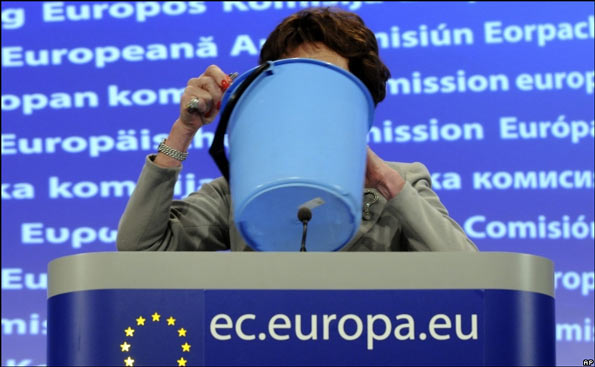Paris, April 19th, 2011 – The European Commissioner for the Digital Agenda, Neelie Kroes, has submitted her long-due report on Net neutrality to the EU Parliament. This extremely disappointing document rules out any immediate measures against telecoms operators who continually restrict EU citizens’ access to the Internet. Hiding behind false free-market arguments, Mrs Kroes gives way to anti-competitive practices harmful to freedom of communication and innovation in the digital environment.
 The long-awaited report1During the revision of the “Telecoms Package” directives, EU institutions purposefully avoided addressing the severe breaches to Net neutrality that telecoms operators already engage in for their commercial interests. At the end of the legislative procedure, in late 2009, the EU Commission nevertheless promised to the European Parliament a report on the issue by the end of 2010. published today fails to offer a convincing policy to protect a free, open and therefore neutral Internet. Under heavy pressure, Kroes carefully avoids taking any action to regulate the way Internet access providers discriminate their users’ Internet traffic. The report actually recycles many statements from the telecoms lobby in order to present them as consensual truths2For instance it justifies blocking of peer-to-peer traffic as an “entirely legitimate” practice to handle congestion, totally ignoring the fact that this very peer-to-peer architecture has been a key enabler for the Internet’s immense growth and variety of applications. If Neelie Kroes’ policy had been implemented in the 1980s, the Internet simply wouldn’t exist..
The long-awaited report1During the revision of the “Telecoms Package” directives, EU institutions purposefully avoided addressing the severe breaches to Net neutrality that telecoms operators already engage in for their commercial interests. At the end of the legislative procedure, in late 2009, the EU Commission nevertheless promised to the European Parliament a report on the issue by the end of 2010. published today fails to offer a convincing policy to protect a free, open and therefore neutral Internet. Under heavy pressure, Kroes carefully avoids taking any action to regulate the way Internet access providers discriminate their users’ Internet traffic. The report actually recycles many statements from the telecoms lobby in order to present them as consensual truths2For instance it justifies blocking of peer-to-peer traffic as an “entirely legitimate” practice to handle congestion, totally ignoring the fact that this very peer-to-peer architecture has been a key enabler for the Internet’s immense growth and variety of applications. If Neelie Kroes’ policy had been implemented in the 1980s, the Internet simply wouldn’t exist..
Last week, a cross-party mission from the French Parliament issued a courageous report denouncing the anti-competitive and dangerous behaviour of operators. The document relied on a sound definition of Net neutrality to propose pro-active regulation3The French parliamentary report includes a call for the legislative protection of Net neutrality, which is defined as “the ability of Internet users to send and receive any application of their choice, to connect any device and use the programs of their choice, as long as they do not harm the network, with a quality of service that is transparent, sufficient and non-discriminatory (…)”. Unlike the Commission, French MEPs make a strict interpretation of the non-discrimination criteria, as the report explains that all traffic should be treated equally, thereby rejecting so-called traffic differentiation (which allows for different treatments according to the type of traffic). See p. 71.. Neelie Kroes’ report does the opposite by turning this founding principle into a mere competition issue, stating that there is no problem and that any bad behaviour will be solved by the market anyway.
“This very disappointing report contrasts with Commissioner Neelie Kroes’ multiple statements regarding the importance of preserving Net neutrality in order to protect EU citizens’ fundamental freedoms. Quite shockingly, the Commission thinks that Net neutrality is compatible with traffic differentiation on the public Internet. This clearly favors telecoms operators who want to boost their profit margins by discriminating users’ communications,” declares Félix Tréguer, in charge of policy and legal affairs at La Quadrature du Net.
According to Neelie Kroes’ report, “bad press” for operators and users “voting with their feet” by switching operators can solve any infringement of Net neutrality. But this simplistic spin does not stand the test of reality. In practice, millions of users can only chose one operator to connect to the Internet, either because of geographical or commercial constraints.
“Mrs Kroes hides behind false free-market arguments to do nothing at all, pretending that competition and consumer law can successfully address the issue. In most Member States, mobile phone operators agree on engaging in the very same discriminations in their so-called ‘mobile Internet’ offers. These operators simply do not offer access to the universal platform of communications we call ‘the Internet’. By turning a blind eye on these practices, the Commission covers anti-competitive behaviours that hinder innovation and violate users’ freedom of communication,” concludes Jérémie Zimmermann, spokesperson for the citizen organization.
For more information, see La Quadrature’s response to the Net neutrality consultation4http://www.laquadrature.net/en/la-quadrature-answers-the-eu-questionnaire-on-net-neutrality.
References

